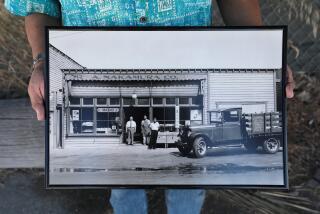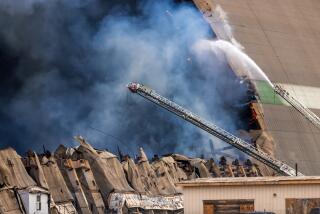Next Step : Hopeful Filipinos Foresee a Boom as U.S. Exits Subic Bay : The base itself is worth $1.35 billion. Whether the country can capitalize on it remains an open question.
- Share via
SUBIC BAY NAVAL STATION, Philippines — The three huge floating dry docks have floated away, towed off to Guam, Hawaii and Japan. The recruiting station that brought 35,000 Filipinos into the U.S. Navy is shut. The ship repair facility, one of the Navy’s largest, is closing this month.
The once-busy Officers’ Club and elegant Chart House restaurant are locked and dark. The books are gone from the library, horses sold from the El Kabayo Stables, closing sales under way at the PX. Even the bowling lanes were ripped out and shipped away. And now the U.S. Navy is taking the toilet seats. Not all the toilet seats, mind you, just those in the ladies’ room in the Plaque Bar. But more about them in a moment. The U.S. military retreat from the Philippines after nearly a century of proud service is fast turning one of America’s largest overseas bases into a ghost town of deserted streets, empty buildings and fading memories. Come December, when the U.S. flag is lowered one last time and the complex is formally handed to the Philippine government, a historic era will be over.
Ceded to the United States after the Spanish-American War in 1898, Subic saw action in nearly every subsequent war, including Operation Desert Storm. Officials say 70% of all ammunition, food, mail and other supplies sent to the Navy and Marines in the Persian Gulf came through Subic Bay, the primary logistic, maintenance and training support base for the 7th Fleet.
“This is really the only place in the world that just had everything,” Rear Adm. Thomas A. Mercer, commander of U.S. forces at Subic and in the Philippines, said in a small, windowless office he moved into in mid-July after closing the Navy’s plush, pier-side headquarters. “We really couldn’t have a more strategic base. It’s sad to see it go.”
But the shutting of the giant base, the result of an emotional vote over issues of national sovereignty by the Philippine Senate last September, also offers a unique chance for at least part of the Philippines to finally break free from crippling poverty. Whether the country can capitalize on the opportunity--or whether it will be squandered like so many others, a victim of lethargy and corruption--is an open question.
When it goes, the Navy will hand over buildings and infrastructure worth $1.35 billion, from a newly refurbished 25-megawatt power plant to 1,876 air-conditioned housing units. Since Subic also was a rest and recreation base, other facilities include a palm-fringed resort island, an 18-hole golf course, six swimming pools, three gyms, assorted shooting ranges, tennis courts, baseball diamonds, even a Go Kart track and a paint-ball war game course.
Further, Subic has one of Asia’s finest deep-water ports, a highly skilled labor force, a jumbo jet airport with a 2.4-million-gallon fuel storage farm, the country’s best telephone and communications system and one of Luzon’s last remaining stands of virgin rain forest, complete with chattering monkeys, wild boar and aboriginal tribes.
The primeval 10,000-acre tract, blanketing hills that rise dramatically around the base, is Subic’s watershed. Guarded day and night by armed patrols, the forest was used to train thousands of pilots and Marines in jungle warfare and survival. Whether it will now survive, or be logged bare like most of the country’s other hardwood forests, will be a key test for the new owners.
“This (town) is going to be the first winner in the Philippines,” promised Richard Gordon, the ever-optimistic mayor of Olongapo, the adjacent city of 320,000 known to generations of American sailors and Marines as one of the raunchiest liberty ports in Asia for its hundreds of bars and 6,000 registered “entertainers.”
Gordon’s goal now is to turn Subic and nearby towns into a world-class tourist mecca, a Hong Kong-style, duty-free shopping haven and a bustling light industrial zone. He said 70 local and foreign companies are interested in a variety of projects: turning dorm-like bachelor officer quarters into luxury hotels; luring golf tournaments and sporting events; opening factories, offices, schools and much, much more.
“We have better facilities than any city in the Philippines,” Gordon said cheerfully. “There’s no gloom and doom scenario. There’s only boom and bloom.”
So far, however, it’s just dreams. That includes Gordon’s widely reported announcement in July that Universal Studios and the Walt Disney Co. were coming to set up shop. Both companies quickly denied the reports, and Gordon now admits he was “just thinking aloud. Hoping really.”
“We are not yet in full gear,” explained Rosalinda Ligsay, 47, a former base worker who now works for Gordon in the Subic Bay Metropolitan Authority, one of three government bodies ostensibly in charge of Subic’s future. “We have no promotions. We have no marketing in place.”
Bidding for buildings won’t begin until a World Bank team drafts a master plan, including land-use rules and regulations, in September. By then, 80% of the base will be closed, the final 2,000 U.S. dependents will be gone and only 1,000 of some 14,000 Filipino base workers will still be employed. Only a few thousand active-duty personnel, mostly guards, will stay until December.
“I think they’re very feasible,” base commander Mercer said of Gordon’s plans. “But I think the timing is a question, whether they can get it going so fast.”
If not, another scenario lies only 40 miles away: Clark Air Base. Abandoned by the U.S. Air Force during Mt. Pinatubo’s eruption last summer, and turned over to the Philippine government last November, Clark has been systematically stripped of everything from hospital beds to traffic lights, from jet fuel to dishes.
Many here say Subic will be different. Unlike Clark, there’s only one road in and few villages nearby. There’s been time to plan an orderly departure and hand-over. Security guards will be maintained. Equally important, perhaps, there’s Mayor Gordon, a former college cheerleader who has instilled his town with civic pride and hope.
But for now, there’s mostly sadness. Each Monday, a chartered DC-8 flies off from Cubi Point Naval Air Station, which adjoins Subic, carrying more American families home. And each Friday, more Filipino workers get pink slips in their paychecks.
“Right now, I don’t have a plan,” confessed Violi de los Reyes, 38, who will be laid off next month after 17 years as a clerical assistant. She earns $300 a month, a good salary here, and will get one month’s separation pay for each year she has worked. But her husband is being laid off from Subic’s ship repair yard, and neither has found a new job.
“We’re really upset,” she said. “We don’t know what’s going to happen. It’s hard to find a job. They want people who are under 25 and single and pay minimum wage (about $4.60 a day). How can we support four kids on that?”
For some, the only options lie overseas. Manny Reyes, 46, area manager for a Japanese electronics subcontractor, has worked 18 years at Subic. Now he has applied for a job in eastern Saudi Arabia. But it means earning less than half his current $1,200-a-month pay, and leaving his wife and two kids behind.
“If we stay here, we can’t support our families,” he said. “The economic situation is very bad. Especially for someone my age.”
Neither he nor his co-worker, Roberto Ordona, 34, an electronics technician, has much faith in Gordon’s plans. “I’ll believe it when I see it. They’re just fooling the people,” Ordona said bitterly. In the meantime, he too is moving to Saudi Arabia.
The departing Americans are no happier.
“I’m leaving with a great deal of regrets,” said Ed Doucette, 56, a civilian contractor who married a Filipina and has lived here for 27 years. He is now moving to Hawaii. “My children still call this home.”
Most of the ocher-colored, raised duplex “spider homes” in the Binictican housing area already are empty, their lawns overgrown. In one driveway, Navy communications electrician Raymond Pixler, 27, watched as movers loaded his family’s crated furniture onto a truck for transfer to Hawaii. “I’d like to stay,” he said. “I’d like to have finished my tour.”
Like thousands of other sailors, Pixler married a woman from a nearby town. Subic’s “bride school,” which teaches prospective local wives everything from cooking to keeping a checkbook, did a record business in March: 104 couples were married. Now only a handful of couples are registered.
In the past, the vast majority of those marriages later collapsed. And the streets of Olongapo are filled with another enduring legacy of the American years: an estimated 2,000 Amerasian children left behind by servicemen who frequented the city’s bars, brothels and massage parlors. Another legacy is sadder still: At least 40 bar girls have tested positive for the AIDS virus.
But generations of Navy pilots left a lighter legacy as well: the Plaque Bar.
On a grassy hill overlooking the Cubi Point runway and sparkling Subic Bay, the officers’ bar was festooned with some 900 carefully carved and wildly colored insignias and plaques, and such mementos as bomb casings, a cockpit and a bedpan. They dangle from the ceiling, are turned into tables, line every inch of the walls. All are inscribed with the exploits, real or imagined, of each naval squadron, from “Gonzo Station” to “Joel and Ron’s Excellent Adventure.”
But the packers arrived here last month as well. First to go were gaudy Marine plaques used as bathroom doors and toilet seats in the women’s restroom. In coming weeks, all the other plaques will also be crated and shipped to the Naval Aviator’s Museum in Pensacola, Fla., where the bar will be faithfully recreated.
That doesn’t make leaving any easier for club manager Judy Augustine, 50, of Ft. Ord, Calif., the first and last woman to run a Navy club in the Philippines. Her three years here were unique, she said, from an earthquake to the awesome eruption of Mt. Pinatubo.
“Truth is, I have never lived so well in all my life,” she said, as two young pilots drank cold beer and three gray-haired, pot-bellied American civilians held down the cigarette-scarred bar. “You just can’t imagine a better tour of duty.”
And now it’s coming to an end.
“I’m praying it does not turn out to be like Clark Air Base,” she said sadly. “I hope it’s not raped and pillaged.
“The truth is it’s a lot like a divorce,” she said, as tears began welling up in her eyes. “I feel the same kind of sadness (I felt) years ago when I got divorced. It’s the end. It’s death. It’s awful.”
More to Read
Sign up for Essential California
The most important California stories and recommendations in your inbox every morning.
You may occasionally receive promotional content from the Los Angeles Times.














